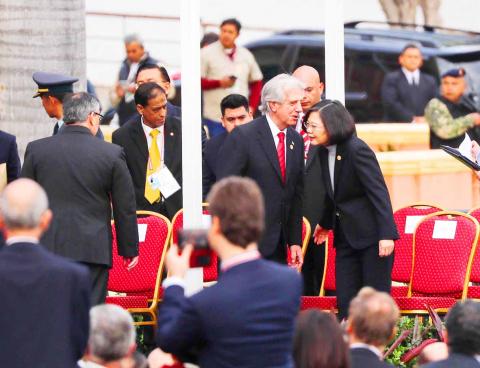Uruguay’s decision to halt visa-free entry for Taiwanese from Wednesday was due to pressure from Beijing, a source said yesterday.
The announcement by Uruguay, which ended diplomatic ties with Taiwan in 1988, was unexpected, the source said.
Chinese General Administration of Customs Minister Ni Yue-feng (倪岳峰) on Monday visited Uruguay, where he reportedly met with Uruguayan Minister of Foreign Affairs Rodolfo Nin Novoa as the two nations celebrated the 30th anniversary of formal diplomatic ties, the source said.

Photo: CNA
However, the Ministry of Foreign Affairs in Taipei yesterday cited technical issues for Uruguay’s decision.
Uruguay halted the preferential treatment for Taiwanese because its online e-visa application system is still being developed, the ministry said.
Until further notice, Taiwanese would have to apply for a visa at the Uruguayan embassy in Japan, ministry spokesman Andrew Lee (李憲章) said.
The ministry said that it would continue to approach the Uruguayan government and strive to have the relevant procedures completed as soon as possible so that Taiwanese could again enjoy the convenience of visa-free entry into Uruguay.
Uruguay began offering visa-free entry for up to 90 days on Oct. 19, making it the 169th nation at the time to offer Taiwanese preferential visa treatment.
The ministry had previously said that visa-free access was granted due to steps taken by the Taipei Commercial and Cultural Office in Argentina, which also handles Uruguayan affairs.
Additional reporting by CNA

The US government has signed defense cooperation agreements with Japan and the Philippines to boost the deterrence capabilities of countries in the first island chain, a report by the National Security Bureau (NSB) showed. The main countries on the first island chain include the two nations and Taiwan. The bureau is to present the report at a meeting of the legislature’s Foreign Affairs and National Defense Committee tomorrow. The US military has deployed Typhon missile systems to Japan’s Yamaguchi Prefecture and Zambales province in the Philippines during their joint military exercises. It has also installed NMESIS anti-ship systems in Japan’s Okinawa

‘WIN-WIN’: The Philippines, and central and eastern European countries are important potential drone cooperation partners, Minister of Foreign Affairs Lin Chia-lung said Minister of Foreign Affairs Lin Chia-lung (林佳龍) in an interview published yesterday confirmed that there are joint ventures between Taiwan and Poland in the drone industry. Lin made the remark in an exclusive interview with the Chinese-language Liberty Times (the Taipei Times’ sister paper). The government-backed Taiwan Excellence Drone International Business Opportunities Alliance and the Polish Chamber of Unmanned Systems on Wednesday last week signed a memorandum of understanding in Poland to develop a “non-China” supply chain for drones and work together on key technologies. Asked if Taiwan prioritized Poland among central and eastern European countries in drone collaboration, Lin

NO CONFIDENCE MOTION? The premier said that being toppled by the legislature for defending the Constitution would be a democratic badge of honor for him Premier Cho Jung-tai (卓榮泰) yesterday announced that the Cabinet would not countersign the amendments to the local revenue-sharing law passed by the Legislative Yuan last month. Cho said the decision not to countersign the amendments to the Act Governing the Allocation of Government Revenues and Expenditures (財政收支劃分法) was made in accordance with the Constitution. “The decision aims to safeguard our Constitution,” he said. The Constitution stipulates the president shall, in accordance with law, promulgate laws and issue mandates with the countersignature of the head of the Executive Yuan, or with the countersignatures of both the head of the Executive Yuan and ministers or

CABINET APPROVAL: People seeking assisted reproduction must be assessed to determine whether they would be adequate parents, the planned changes say Proposed amendments to the Assisted Reproduction Act (人工生殖法) advanced yesterday by the Executive Yuan would grant married lesbian couples and single women access to legal assisted reproductive services. The proposed revisions are “based on the fundamental principle of respecting women’s reproductive autonomy,” Cabinet spokesperson Michelle Lee (李慧芝) quoted Vice Premier Cheng Li-chiun (鄭麗君), who presided over a Cabinet meeting earlier yesterday, as saying at the briefing. The draft amendment would be submitted to the legislature for review. The Ministry of Health and Welfare, which proposed the amendments, said that experts on children’s rights, gender equality, law and medicine attended cross-disciplinary meetings, adding that